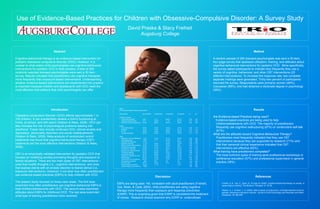
McNair Research Poster APA Dimensions
- 1. Use of Evidence-Based Practices for Children with Obsessive-Compulsive Disorder: A Survey Study David Praska & Stacy Freiheit Augsburg College Abstract Cognitive-behavioral therapy is an evidence-based intervention for pediatric obsessive-compulsive disorder (OCD). However, it is unclear to what extent child psychologists use cognitive-behavioral interventions for pediatric OCD in their practice. A total of 250 randomly selected licensed psychologists were sent a 30 item survey. Results indicated that practitioners use cognitive therapies more frequently than exposure-based interventions. Understanding whether evidence-based interventions are implemented into practice is important because children and adolescents with OCD need the most effective interventions that child psychologists can offer. Method A random sample of 250 licensed psychologists was sent a 30-item, four-page survey that assessed utilization, training, and attitudes about cognitive-behavioral interventions for pediatric OCD. More specifically, the survey asked participants to indicate how frequently they use a variety of cognitive, behavioral, and other CBT interventions (25 different interventions). To increase the response rate, two complete separate mailings were generated. Thirty-two percent of participants returned the survey. Respondents were primarily women (66%), Caucasian (88%), and had obtained a doctorate degree in psychology (36%). Table 1 Are Evidence-based Practices being used? Interventions Never/Rarely Occasionally Sometimes Frequently M SD Cognitive Therapy Constructive self-talk 3.6% 7.1% 28.6% 60.7% 3.46 .793 Cognitive Restructuring 3.7% 18.5% 11.1% 66.7% 3.41 .931 Minimize thought Suppression 32.0% 28.0% 24.0% 16.0% 2.24 1.09 EX/RP Client self-directed 18.5% 18.5% 18.5% 44.4% 2.89 1.19 Imaginal 19.2% 11.5% 46.2% 23.1% 2.73 1.04 In vivo 44.4% 14.8% 18.5% 22.2% 2.19 1.24 Therapist-assisted 22.2% 25.9% 33.3% 18.5% 2.11 1.22 Other Relaxation training/ Meditation 3.4% 10.3% 31.0% 55.2% 3.38 .820 Psychoeducation 3.6% 7.1% 39.3% 50% 3.36 .780 Parent/family Sessions 10.3% -- 41.4% 48.3% 3.28 .922 Breathing retaining 11.1% 18.5% 29.6% 40.7% 3.00 1.04 Remove parent reinforcement15.4% 19.2% 15.4% 50% 3.00 1.17 Mindfulness exercises 14.3% 21.4% 35.7% 28.6% 2.79 1.03 Increase fun activities 18.5% 11.1% 48.1% 22.2% 2.74 1.02 Exposure to Feared stimulus 21.4% 21.4% 25% 32.1% 2.68 1.16 Therapist modeling 22.2% 25.9% 33.3% 18.5% 2.48 1.05 Social skills training 35.7% 28.6% 17.9% 17.9% 2.18 1.12 Treatmentmanuals for OCD 33.3% 37.0% 14.8% 14.8% 2.11 1.05 Bibliotherapy 44.4% 18.5% 25.9% 11.1% 2.04 1.09 Time-out for OCD symptoms 64.3% 17.9% 7.1% 10.7% 1.64 1.03 Interoceptive exposure 64% 24% 8% 4% 1.52 .823 Intensive CBT 70.4% 18.5% 7.4% 3.7% 1.44 .801 Group therapy (not OCD) 85.2% 11.1% -- 3.7% 1.22 .641 Group therapy (OCD specific)100% -- -- -- 1.00 .000 Introduction Obsessive-compulsive disorder (OCD) affects approximately 1 in 100 children. It can substantially disable a child’s functioning at home, at school, and with peers (Watson & Rees, 2008). OCD can also increase the risk of psychological problems leading into adulthood. These risks include continued OCD, clinical anxiety and depression, personality disorders and social maladjustments (Watson & Rees, 2008). Meta-analysis of randomized control treatments has found that cognitive-behavioral therapy (CBT) treatments are the most effective interventions (Watson & Rees, 2008). CBT is an empirically-validated intervention for pediatric OCD that focuses on modifying anxiety-provoking thoughts and exposure to feared situations. There are two main types of CBT interventions -- ones that modify thoughts (i.e., cognitive interventions) and ones that expose clients with an anxiety disorder to feared stimuli (i.e., exposure interventions). However, it not clear how often practitioners use evidence-based practices (EBPs) to help children with OCD. The present study focused on three main areas. The first area examined how often practitioners use cognitive-behavioral EBPs to treat children/adolescents with OCD. The second area examined attitudes about EBPs for childhood OCD. The last area examined what type of training practitioners have received. Results Are Evidence-based Practices being used? Evidence-based practices are being used to help children/adolescents with OCD. The majority of practitioners frequently use cognitive restructuring (67%) or constructive self-talk (61%). What are the attitudes toward Cognitive-Behavioral Therapy? Practitioners most frequently indicated that they use CBT interventions because they are supported by research (71%) and that their personal clinical experience indicated that CBT interventions are effective (62%). What training have practitioners completed? The most common types of training were professional workshops or conference education (57%) and professional supervision in general practice (38%). Discussion EBPs are being used. Yet, consistent with adult practitioners (Freiheit, Vye, Swan, & Cady, 2004), child practitioners are using cognitive therapy more frequently than exposure and response prevention (EXRP). This is surprising given that EXRP is considered the treatment of choice. Research should examine why EXRP is underutilized. References Freiheit, S. R., Vye, C., Swan, R., & Cady, M. (2004). Cognitive-behavioral therapy for anxiety: Is dissemination working? The Behavior Therapist, 27, 25-32. Watson, H. J., & Rees, C. S. (2008). Meta-analysis of randomized, controlled treatment trials for pediatric obsessive-compulsive disorder. Journal of Child Psychology and Psychiatry and Allied Disciplines, 49, 489-498.